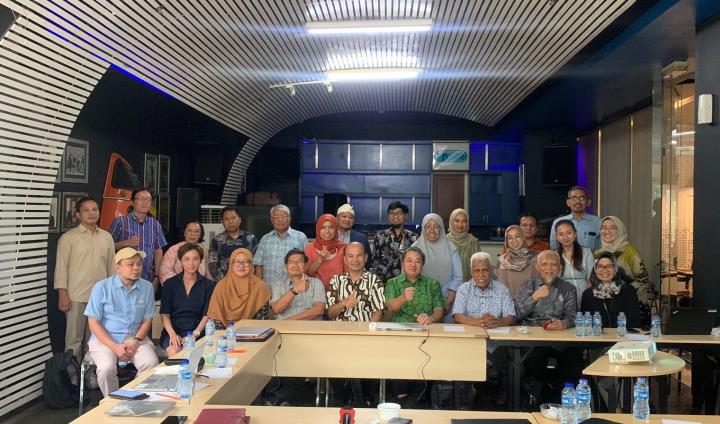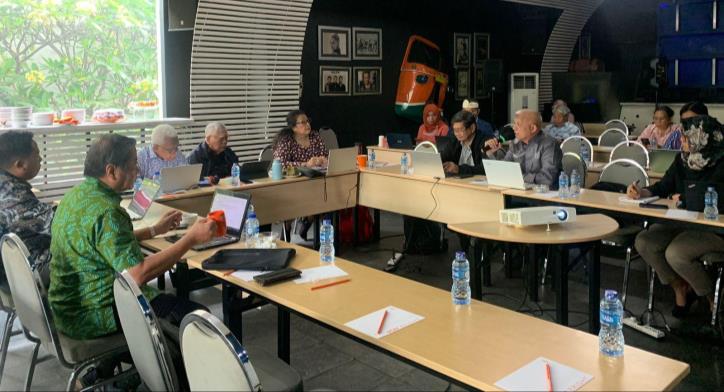| 13 – 14 NOVEMBER 2023 | HARRIS HOTEL |
Estimated reading time: 6 minutes
Mandatory food fortification is one of the most useful and effective efforts to address micronutrient deficiencies. However, there have been many problems along the way with policy changes and inconsistencies. Therefore, this FGD was conducted to find out the perceptions and constraints of the private sector in implementing food fortification programs, to find out the support needed from the government, and to become a forum for collaboration between the government and the private sector.
The FGD was conducted at Harris Hotel Tebet for two days on November 13-14, 2023, which included four sessions, namely sessions on rice, salt, cooking oil and wheat flour fortification. Participants in this FGD were representatives from Bappenas, KFI, Nutrition International, UNICEF, GAPMMI, PERPADI, Food Station, PT Thara Jaya Niaga Holding, AIMMI, PT Yorgo Anugrah Nusantara Medan, GAIN, APROGAKOB, Kimia Farma, and APTINDO.
In her opening remarks, the Director of KFI, Dra. Nina Sardjunani MA, said that food fortification is intended to meet the micronutrient needs of society. Cooking oil, salt and wheat flour are commodities that need to be fortified. At present, rice fortification is still under development and not yet mandatory. As for fortification of palm cooking oil (MGS), the problem faced is that most of the MGS is traded in bulk and is not fortified. Considering that bulk oil is consumed by low-income people, KFI is making efforts to apply fortification to packaged and bulk palm cooking oil. Mrs. Nina also conveyed the importance of the salt fortification program which is closelyrelated to children's intelligence towards Indonesia Emas 2045. Wheat flour fortification, along the way, had a relaxation in its implementation until it was reintroduced. The dynamics of the food fortification program encouraged KFI to support the Public Private Partnership (PPP) Forum as a forum for stakeholders to regularly discuss, evaluate and identify problems in the implementation of food fortification as well as alternative efforts to overcome them.

The first session of this FGD was on rice fortification, which is still under development. The discussion showed that rice fortification is supported by various parties, although it is not yet mandatory. One of the obstacles in rice fortification is the cost of the fortificant (grain), which is still expensive at Rp500-Rp1,000/kg plus the cost of mixing at Rp400. As a result, the selling price is still above the price ceiling and not affordable for low-income people who need it more. In addition, efficacy studies are still needed to determine the impact on the community. The standard for premix kernel is currently being developed by the Ministry of Health. It is also very important to educate the public so that they can accept and use fortified rice appropriately.
(kernel) yang masih mahal sekitar antara Rp500-Rp1.000/kg ditambah biaya mixing sebesar Rp400. Hal ini menyebabkan harga jual masih diatas HET dan belum terjangkau masyarakat berpendapatan rendah yang lebih membutuhkan. Selain itu, masih diperlukan studi efektivitas untuk mengetahui dampaknya terhadap masyarakat luas. Standar premix kernel saat ini sedang disusun oleh Kementerian Kesehatan. Edukasi kepada masyarakat juga sangat penting dilakukan sehingga nantinya dapat menerima beras fortifikasi dengan baik dan memanfaatkannya dengan tepat.

Fortification of edible oil was discussed in the second session of the FGD. Fortification of MDS has been initiated since 2008. The SNI for palm edible oil has changed from SNI 7709:2012 to SNI 7709:2019. Prof. Drajat Martianto, in his introduction to the discussion, stated that currently only 30% of edible oil in circulation is fortified, namely packaged edible oil. The rest is bulk edible oil that has not been fortified. The representative of the Association of Indonesian Edible Oil Industries (AIMMI), Mr. Arief Wibisono, revealed that the industry is ready and committed to implement edible oil fortification. The cost of fortifying palm edible oil is not an issue. The concern of the industry is the need for harmonization between MOT, MOI and BPOM regulations so that the regulation of fortification of packaged cooking oil and bulk cooking oil is consistent. In addition, Mr. Arief also said that since the DMO (Domestic Market Obligation) policy, producers are required to allocate 30% for minyakita, resulting in less production of premium packaged cooking oil. The representative of the edible oil industry, Mrs. Susan, argued that until now, the industry is waiting for the effectiveness test of MGS fortification to improve the nutrition of the Indonesian people. Representatives from academia, Prof. Nuri Andarwulan also emphasized the need for synchronization among relevant ministries and institutions to harmonize regulations on MGS fortification. In addition, there is a need to improve the education of vendors and consumers on the handling of palm edible oil to prevent vitamin A degradation due to exposure to sunlight. The industry expects the government to improve coordination between ministries in harmonizing regulations.
The next discussion session was on salt fortification. This FGD highlighted the role and perception of the salt industry and what is expected from the industry to the government. Salt fortification has encountered many obstacles along the way, including the revocation of Permendagri 63/2010 through Permendagri 6/2018. Mr. Budi Satriyono, a representative of APROGAKOB, said that the existence of IKM salt producers who do not comply with the regulations and are not coordinated needs more attention. Mr. Rozy Jafar from Nutrition International added that there is an element of politicization, which can be seen in the reluctance of producers to renew their permits because of the samesanctions between products that do not have the SNI and those that have the SNI but do not renew their permits. The representative of UNICEF, Ms. Dewi Fatmaningsih, emphasized the need for a joint discussion among stakeholders on who has the authority to impose sanctions on salt companies that do not comply with the regulations. Regarding the availability of KIO3, Mr. Budi Puspo Hudojo from Kimia Farma (KF) said that KF's production is only about 20-25 tons per year. However, KF is committed to meet the domestic demand of fortified salt farmers. Mr. Adhi S. Lukman, representative of GAPMMI also emphasized the need to reactivate Permendagri as a legal umbrella for local governments to activate the GAKY team. Mr. Akim Dharmawan from the Directorate of KGM Bappenas added that in the future, the LSFF Forum will be a forum to discuss problems, barriers and synchronization of food fortification programs.

The last discussion session was on wheat flour. This session was attended by APTINDO and representatives from several wheat flour industries. Until now, almost 100% of the wheat flour industry has fortified and complied with SNI. Mr. Yosafat Siregar, representative of APTINDO, stated that the cost of wheat flour fortification reached 250 billion / year, this figure is quite large so it is necessary to study the effectiveness of wheat flour fortification that has been running, and it is hoped that the Ministry of Health can coordinate its implementation. Representative from UNICEF, Mrs. Dewi Fatmaningrum said that the content of fortification in wheat flour in Indonesia is still below WHO recommendations. In addition, there are great expectations from the industry regarding coordinated supervision. APTINDO also feels that currently many people are anti-wheat, so the alternative that can be done is to develop local flour and this requires government support. With the LSFF Coordination Forum, it is expected that various issues and problems can be discussed and efforts to resolve them formulated (Rep: Rhm & Han. Ed: Roz & Elm).
Releated:


